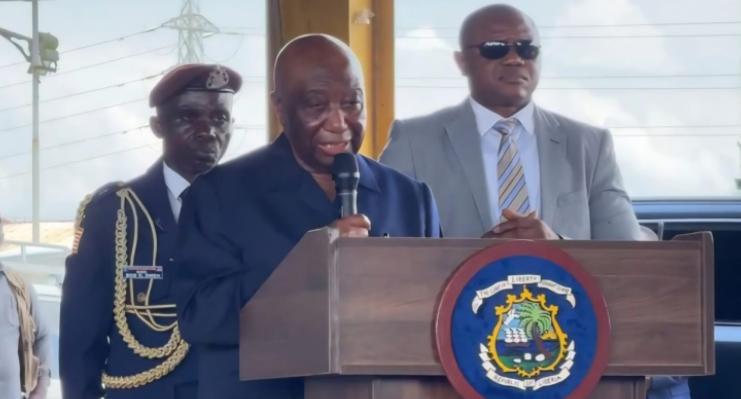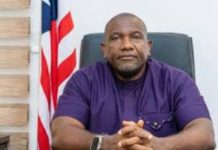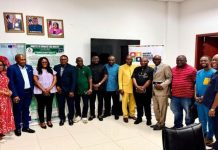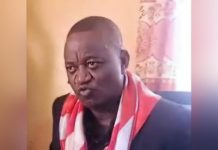Africa-Press – Liberia. The chanting began quietly — just a few murmurs rippling through the crowd gathered at Broad and Randall Streets. Then, as the bus carrying President Joseph Boakai rolled deeper into the bustling intersection, the murmurs swelled into a bold chorus: “Boo! Boo! Boo!” It was not the reception anyone in the presidential convoy had expected.
The government had billed Thursday as a moment of progress, a symbolic step toward easing Liberia’s chronic transportation struggles. Instead, it became a vivid display of public dissatisfaction, the kind that can no longer be softened by ceremonial speeches or shiny new vehicles.
For many Liberians — especially street vendors whose livelihoods have grown increasingly fragile — the unveiling of public buses felt painfully disconnected from the harsh economic reality they face every day.
Earlier that morning, the mood at the National Transit Authority compound in Gardnersville had been markedly different. Government officials, transport workers, and community representatives gathered under the sun to witness what the administration framed as a milestone: the presentation of a new fleet of public buses financed through ECO Bank Liberia.
The President spoke confidently about accountability and the importance of ensuring the buses serve the public good. After the speeches, he boarded one of the gleaming machines for a demonstration ride through major parts of Monrovia.
As the bus pulled away from the NTA yard, supporters waved and cheered. The convoy moved through Japanese Drive, across Bushrod Island, and onward toward Central Monrovia. It was intended to be an exhibition of accessibility and renewal, an effort to reassure the public that improved transportation was taking shape.
But the President’s arrival in downtown Monrovia — particularly at Broad and Randall Streets — brought the realities of the country’s economic tension into sharp focus.
Broad and Randall Streets is not just a busy intersection; it is a living, breathing ecosystem of survival. Street vendors fill every inch of space with makeshift tables, wheelbarrows, and baskets of goods ranging from jeans to roasted peanuts. For many, this spot is the difference between eating and going hungry. Yet it is also a place where they feel hunted.
When city police descend on the area, vendors say their goods are confiscated, trampled, or destroyed. They are chased from one corner to another, never knowing when the next raid will strike. So as the President’s bus rolled past, the frustrations boiling beneath their daily struggle erupted.
“We are not happy,” said Kebbeh Kollie, her voice rising above the noise of the market. “They took me by force from Mechlin Street. Even when I move to another corner, they still chase me and damage my market. So long as we can’t find our daily bread in peace, we can’t be happy. That bus—we will eat it?”
Her words hung heavy in the air, capturing the sentiment many shared but rarely had the chance to express directly to the nation’s leader.
Citizens Boo President Boakai At Unveiling of Public Buses
Vendors and residents alike told a similar story that the buses, though helpful in theory, felt disconnected from the deeper economic hardship affecting nearly every household. Some questioned the timing. Others wondered why a country where basic food items have become unaffordable would prioritize public transit before tackling unemployment and inflation.
“We need jobs,” said Joseph Kerkula, a resident of Gardnersville who stood watching as the crowd jeered. “The hardship is too much in this country. What will the buses do for someone who doesn’t even have money to come to town? Will the bus bring them for free? We need work to take care of our families. What good are the buses when there’s hardship everywhere?”
For Kerkula, the issue was not the buses themselves but what they symbolized: another attempt at progress that felt detached from daily realities.
Beyond economics, the scene spoke to a deeper tension around space and belonging. Monrovia has long lacked adequate infrastructure to accommodate the thousands of informal traders who depend on street commerce for survival. Without designated markets or supportive regulations, vendors are ghostlike—visible everywhere, yet accepted nowhere.
“We are street vendors; we belong in the street,” said Grace Mulbah, who sells ladies’ clothing near the intersection. “People leave their houses to sell, but no one is buying. Moreover, the city police keep running behind us. There is no market building for us.”
Her statement revealed a truth often overlooked in policy discussions. For many Liberians, the street is not a nuisance to be cleared; it is the only accessible marketplace in a city with few formal alternatives.
Not everyone viewed the bus unveiling through the lens of disappointment. Some residents saw it as a practical step toward easing daily financial strain. For low-income commuters who spend large portions of their earnings on transportation, cheaper public buses are nothing to dismiss.
“The public buses are not for ministers; they’re for the common people like us,” said Nancy Doe from Old Road. “Times are hard, but these buses will make life easier for poor people. Everything in Liberia can’t just be about rice.”
Her perspective highlighted the complexity of the issue. Even amid frustration, some citizens acknowledge that change often comes in incremental steps.
Still, the message delivered at Broad and Randall Streets was unmistakable. For all the government’s development efforts, the pressure of everyday life continues to overshadow public achievements. Prices of food and basic commodities remain high, jobs are scarce, and many feel that the economic situation has deteriorated since the current administration took office.
Thursday’s incident was more than a crowd booing the President; it was a collective cry for attention, a demand that the government confront issues that weigh heavily on ordinary Liberians.
The National Transit Authority insists that the new buses will help reduce transportation costs and improve mobility across Monrovia and beyond. If implemented effectively, the system could offer some relief to thousands of commuters who spend hours and significant income navigating the city’s congested roads.
Yet, as the reactions on Broad and Randall Streets revealed, transportation is only one piece of a much larger puzzle. Until economic relief becomes tangible — until vendors can sell without fear, families can eat without worry, and job seekers can find work — such public initiatives may continue to be met with skepticism, or even defiance.
On a day meant to symbolize movement, the public’s response offered a different reflection that until the nation’s economic engine starts moving again, new buses alone will not carry Liberia forward.
For More News And Analysis About Liberia Follow Africa-Press






